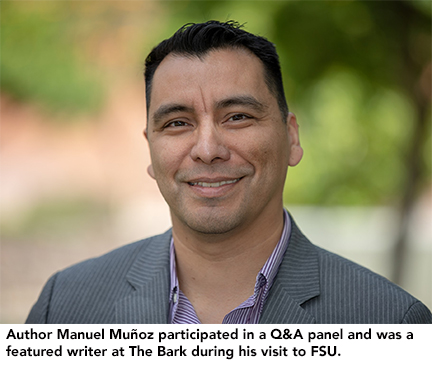English department and Creative Writing graduate students collaborate to bring award-winning author Manuel Muñoz to FSU
By Giana Nardelli
Award-winning author Manuel Muñoz recently visited Florida State University for a daylong celebration of his writing.
The FSU English department, the Southeast Review, and the Jerome Stern Reading Series coordinators worked together to arrange Muñoz’ visit.
 “Every campus reading and presentation is the work of a lot of people,” says Muñoz, a professor of English at the University of Arizona. “As I understand it, this was student-led and organized, too, which makes this visit extra special.”
“Every campus reading and presentation is the work of a lot of people,” says Muñoz, a professor of English at the University of Arizona. “As I understand it, this was student-led and organized, too, which makes this visit extra special.”
He participated in a Q&A panel on April 4 in the Williams Building Common Room, where students, faculty, and members of the community were able to ask questions about the author and his writing. That evening, he was a featured writer at The Bark, where he read from his latest collection, The Consequences.
The Consequences is Muñoz’s fourth publication and his first title in 15 years, when his novel What You See In The Dark was released. His works have been recognized with a Whiting Writer’s Award, three O. Henry Awards, two selections in Best American Short Stories, and in mid-April he was awarded the 2023 Joyce Carol Oates Prize.
The Consequences is a collection of short stories that describe the principle of obligation through the lives of many characters, each set in the 1980s southwestern U.S. The subject is close to home for Muñoz, who was born and raised in southern California. He says experiences he witnessed throughout his own upbringing heavily influenced the narratives within these stories.
Emilio Carrero is a doctoral candidate for FSU’s Creative Writing Program, and they were a graduate student at the University of Arizona before enrolling at FSU. Carrero, who is the upcoming assistant editor for the Southeast Review, reached out to Muñoz directly to invite him to FSU.
“Our emphasis was on diversity and inclusion,” Carrero says, “and the key criteria of selecting the reader for this event was someone who comes from a marginalized background. It is super important, especially in English—which historically as a department has tended to be very much white and masculine—to have voices of someone who is not only Mexican-American, a personal of color, but also a queer person who has been able to carve out a career in life in that kind of culture.”
It is super important, especially in English—which historically as a department has tended to be very much white and masculine—to have voices of someone who is not only Mexican-American, a personal of color, but also a queer person who has been able to carve out a career in life in that kind of culture.
— Emilio Carrero
Muñoz says his motivation for writing stems from the inspiration his community has given him over the years.
“When I do readings and presentations in my Central Valley community, I am reminded of how special it is to be a writer who focuses on our area,” Muñoz says. “In the part of California where I am from, students are often seeking to get out to the bigger cities and only come to appreciate our Valley home many years later as a potential source of creativity.”
He reads often at Reedley College, a community college just six miles from where he grew up, and says those events are “always a special moment.”
“We always have a packed auditorium of first-generation students who are seeing, most likely for the first time, a writer who comes from a town that looks very much like theirs,” he adds.
The department event and the reading at The Bark featured large gatherings, with many members of the FSU and Tallahassee community able to speak with and listen to Muñoz during his time.
“I am especially grateful to Emilio, with whom I worked closely in the M.F.A. program at the University of Arizona,” Muñoz says.
Muñoz was one of Carrero's graduate professors.
“In terms of a teacher, he’s very hands-on. One who is willing to dedicate his time and energy to you and to helping you grow as a writer … very hands-on, very attentive, and also very personable,” Carrero says about their time spent learning with Muñoz.
“He’s willing to put in the time to get to know you, not just in the classroom, but outside of that,” they add.
This collaboration between the Jerome Stern Reading Series and the Southeast Review has been in the works for a long time, says Olivia Sokolowski, a Reading Series co-host. She emphasizes that it was important for each group to feature an author from an underrepresented community.
Carrero and Sokolowski both anticipate that more partnerships such as this one will take place in the future.
Giana Nardelli is an English major on the editing, writing, and media Track, with a second major in media/communication studies.
Follow the English department on Instagram @fsuenglish; on Facebook facebook.com/fsuenglishdepartment/; and Twitter, @fsu_englishdept
